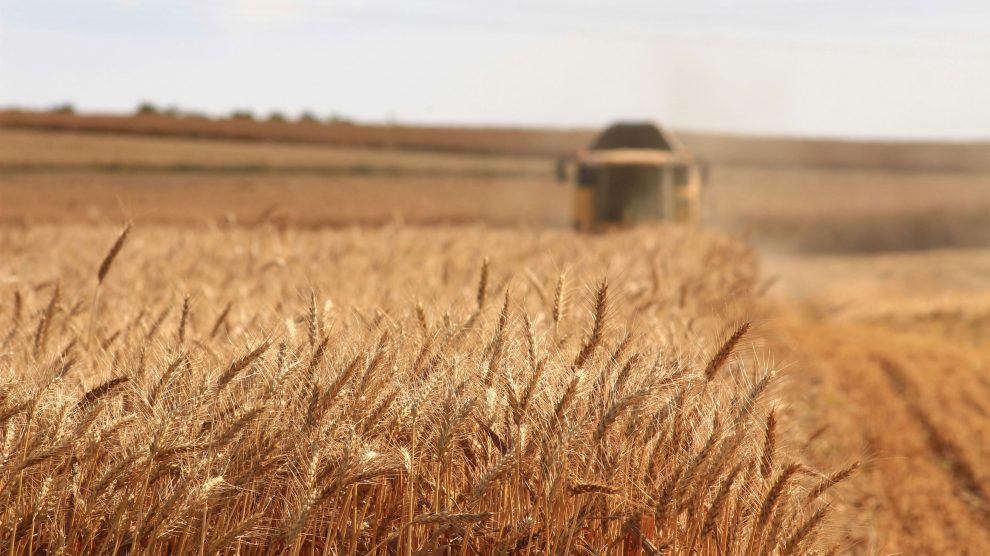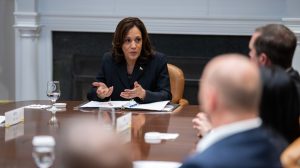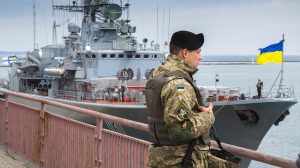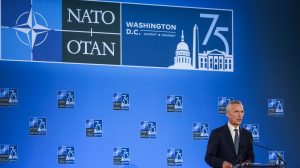Catch up quickly with the stories from Central and Eastern Europe that matter, this week led by …
Russia’s war on Ukraine
Ukraine is prepared to accept restrictions on its trade with the EU to defuse a bitter political dispute with Poland, but is also urging the bloc to ban Russian grain imports, the Ukrainian trade minister said this week.
Taras Kachka told the Financial Times that Kyiv was in favour of new curbs on Ukrainian agricultural imports, although the EU also needed to ban Russian farm exports that are still reaching the bloc via Belarus and the Baltics.
“Maybe for a transitional period this kind of . . . managed approach to trade flows between Ukraine and the EU is something that we all need,” Kachka said. But he added: “For wheat, it is not Ukraine that is causing problems for Polish farmers, it is Russia.”
After Russia’s full-scale invasion of Ukraine in 2022 the EU lifted tariffs on Ukrainian imports, but Poland and other neighbouring countries soon experienced a glut and farmers have taken to the streets and joined border blockades to protest the unfair competition.
On Wednesday, thousands of Polish farmers protested outside the prime minister’s office, burning tyres and throwing firecrackers as they demanded a halt to cheap imports and environmental regulations they say harm their livelihoods.
Deadly explosions rocked Ukraine’s southern port city of Odesa on Wednesday as President Volodymyr Zelensky was meeting Greek PM Kyriakos Mitsotakis.
Ukraine’s navy said five people were killed. No-one from either delegation was hurt.
President Zelensky said Russia had “either gone crazy or they don’t control what their terrorist army is doing”.
During a joint news conference, the Greek prime minister said “we heard the sound of sirens and explosions that took place near us. We did not have time to get to a shelter.”
European Commission President Ursula von der Leyen said in a post on social media she strongly condemned “the vile attack on Odesa” during the leaders’ visit.
The attack comes after 12 people—including five children—were killed by a Russian drone strike on Odesa on Saturday. Two infants less than a year old were among the dead.
Britain is ready to loan Ukraine all frozen Russian central bank assets in the UK on the basis that Russia will be forced to pay reparations to Ukraine at the end of the war, the UK foreign secretary David Cameron said this week.
He said the assets would be used as surety for the payment of the reparations. The plan is more radical than proposals discussed in the European Union for Ukraine to be given only the windfall profits from the Russian central bank assets being held by the West. The annual windfall profits are estimated at four billion US dollars.
Cameron told peers on Tuesday night:
“There is an opportunity to use something like a syndicated loan or a bond that effectively uses the frozen Russian assets as a surety to give that money to the Ukrainians knowing that we will recoup it when reparations are paid by Russia. That may be a better way of doing it. We are aiming for the maximum amount of G7 and EU unity on this but if we cannot get it I think we will have to move ahead with allies that want to take this action.”
Other news from the region
Bulgarian lawmakers on Wednesday unanimously approved the resignation of Prime Minister Nikolay Denkov and his government, part of a power-sharing agreement by the two main political parties after elections last year. The centre-right GERB party which won last April’s general election and the runner-up, the reformist coalition led by We Continue the Change, agreed that each would hold the top job for nine months at a time. Denkov, of the reformist coalition, is expected to be replaced by GERB’s Mariya Gabriel, a former European Commissioner.
Alexandru Musteață, director of the Moldovan Intelligence and Security Service, SIS, said on Tuesday that Russia is involved in a malign operation to compromise Moldova’s EU accession hopes by interfering in its electoral processes. Musteață said that Moscow first targeted Moldova’s local elections in November 2023 and will now seek to meddle in presidential elections and the country’s EU integration referendum this autumn. “Now they are trying to complete the next two stages…to interfere in the presidential elections, and to denigrate candidates that will promote EU accession,” said Musteață.
A key vote for control of Serbia’s capital, Belgrade—a focal point of widespread fraud reports after last December elections—is to be rerun later this year, officials said on Sunday. The announcement follows months of soaring political tensions over claims that the ruling populists of President Aleksandar Vučić orchestrated a fraud in the vote for Belgrade’s city assembly. Vučić’s Serbian Progressive party was declared the winner of the December 17 election, but the main opposition alliance, Serbia Against Violence, have insisted they were robbed of a victory.
Azerbaijani state television broadcast footage on Tuesday showing mechanical diggers destroying the building that once housed the breakaway ethnic Armenian parliament of Nagorno-Karabakh.The televised demolition, with giant metal claws tearing at the masonry of the gutted edifice, demonstratively underlined the restoration of control by Azerbaijan since its forces recaptured Karabakh last year and more than 100,000 ethnic Armenians fled. Armenia has accused Azerbaijan of ethnic cleansing—a charge denied by Baku, which has insisted the enclave’s Armenians were welcome to remain.
The Polish government this week said it will seek to negotiate an exemption from elements of the EU’s planned migration pact relating to the relocation of asylum seekers. It argues that Poland has a “unique” situation due to the migration crisis on its border with Belarus and its reception of Ukrainian refugees. “The situation on the Polish-Belarusian border is so unique that any solutions to the migration pact should take this specificity into account,” said Interior Minister Marcin Kierwiński in Brussels on Tuesday. “Poland will fight to be simply exempt from these [relocation] mechanisms.”
Estonian PM Kaja Kallas published a photo of her breakfast on Tuesday (muesli, yoghurt, and blueberries; served with a cup of tea) in response to comments from an unnamed EU official who told Politico that Kallas might not be a great choice to become the EU’s next top diplomat because, “Are we really putting someone who likes to eat Russians for breakfast in this position?”. Kallas has long urged other EU leaders not to waver in their support for Kyiv, and Estonia is Ukraine’s largest donor in terms of percentage of GDP—more than 3.5 per cent as of December 2023.
Czechia got its third unicorn this week in the shape of Mews, a Prague-based hotel SaaS developer, which announced that it had raised 110 million US dollars in funding led by Kinnevik, with participation from Revaia, Goldman Sachs Asset Management, Notion Capital, and LGVP. Following the latest funding round (which comes in addition to the company’s 185 million US dollars investment round in December 2022), the company’s valuation has reached 1.2 billion US dollars, meaning that it joins food-services outfit Rohlík and product management software developer Productboard as the third Czech unicorn.
Two-time Grand Slam champion Simona Halep’s four-year ban for doping has been reduced to nine months by the Court of Arbitration for Sport (CAS). The decision means Romanian former world number one Halep, 32, can return to tennis as soon as possible. In response to the ruling, Halep hit out at “scandalous accusations”. While her case was partially upheld, CAS ruled Halep “on the balance of probabilities” had not taken roxadustat intentionally. Halep, who was originally banned until October 2026, feared her career would be over if the original decision was upheld.
Photo by Meriç Tuna on Unsplash.
Unlike many news and information platforms, Emerging Europe is free to read, and always will be. There is no paywall here. We are independent, not affiliated with nor representing any political party or business organisation. We want the very best for emerging Europe, nothing more, nothing less. Your support will help us continue to spread the word about this amazing region.
You can contribute here. Thank you.







Add Comment